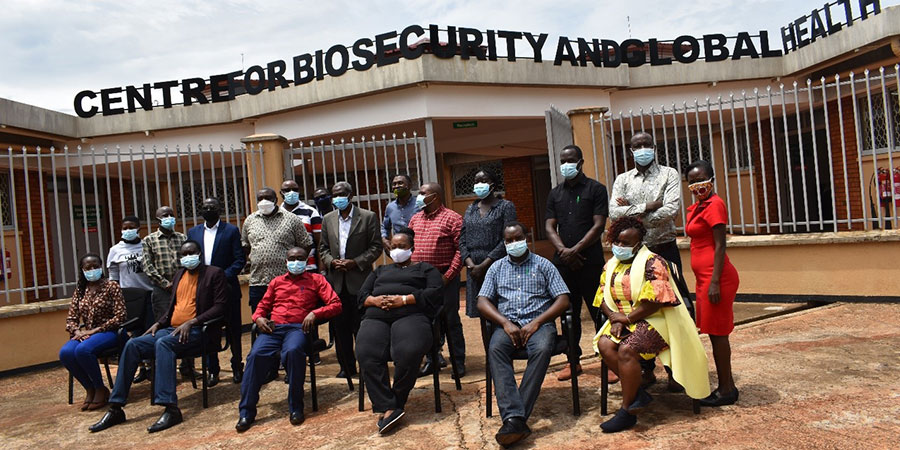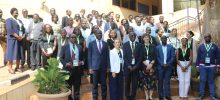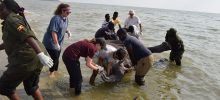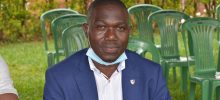Makerere University kicks off Pandemic Preparedness Course with One Health Approach
Written by Joseph Odoi and Jacinta Nakaye
As nations worldwide labour to respond to the COVID-19 pandemic, on 12th April 2021, Makerere University kicked off the Pandemic Preparedness with One Health approach (PPOH) Course to enhance pandemic preparedness and response in East Africa.
This one-month course aimed at equipping participants with the knowledge, attitudes, and skills in disease outbreak, epidemic and pandemic preparedness as well as response in the region.
While launching the course at the Centre for Biosecurity and Global Health, Prof. John David Kabasa, the Principal of Makerere University College of Veterinary Medicine, Animal Resources and Biosecurity (CoVAB), who doubles as principal investigator of the programme said that the course comes as a precursor in pandemic preparedness and response under a one-health approach.
“This is an era of pandemics evidenced by the COVID-19 but before that, we had other epidemics that struck Africa like Ebola in West Africa, Uganda, and DRC’’.To prepare ourselves as the East African community, the secretariat decided that the capacity of our decision-makers needs to be enhanced to shape our destiny, As a result, we launched the first phase of the course in Egerton University, Kenya, and now; Makerere University comes in the second phase of our training, ” he explained.
With knowledge in place, there will be the capability to respond, plan and manage epidemics and pandemics at all times,’’ Prof. Kabasa added.
According to Prof. Kabasa who is also chair of the expert working group for all East African countries under the course, the program begun as short-term course. Upon review after the second phase, the course will proceed to the next step until a master’s degree level.
Distinctively, he expressed his gratitude to the university leadership, Ministry of Health, Ministry of Agriculture, Animal Industry and Fisheries, Ministry for East African Affairs, East African Secretariat, EPOS, and the Germany Government for their selfless support towards the course.
Also, Dr. Gabriel Tumwine, the course co-ordinator noted that this is an opportunity for responders of disease outbreak, frontline implementers, crisis communicators, social scientists, and agriculturalists, to learn from experts who will train them to analyze and explain the challenges of pandemic preparedness and response under a one-health approach.
“We are piloting with 18 people who will be sponsored. After the pilot, we plan to avail the course to both technical and non-technical personnel that directly and indirectly get involved in pandemic preparedness and response,” Tumwine revealed.
He added that the course will be full time and that it encompasses discussions, case studies, problem-based learning, field visits, and integration of learning in multi-disciplinary and interactive workshops, giving opportunities for reflection on the experiences of work-based practice.
This piloting phase of the course, which brought together a multi-disciplinary international team was delivered in a face – to – face encounter. As the course carries on, e-learning modes will also be used.
While speaking on behalf of COVAB, the Deputy Principal, Prof. Samuel Majalija affirmed that Africa is challenged with Pandemics which need to appropriately be addressed.
“East Africa is heavily faced with pandemics and we must work together to see how the system works and ensure that pandemics are addressed multi-disciplinarily,” he said.
This course also brings together various aspects of Preparedness with a One health approach including surveillance, public health measures, risk communication, data management for pandemic Preparedness, policy leadership and governance, impact of pandemics to Agriculture /wildlife among others
In her remarks, Dr.Juliet Kiguli, representing the Dean-Makerere University School of Public Health -Prof. Rhoda Wanyenze in a special way welcomed participants to the pandemic preparedness course with one health dimension adding that its vital in incorporating various professions to respond to pandemics and epidemics .
She also called upon the participants to pay attention to the course given its crucial nature in developing disease outbreak responders and frontline implementers for the good of society
In same spirit, Dr. Timothy Wesonga from the East African Community tasked the participants to give full attention to the PPOH course so that they be retooled with knowledge and skills required to enhance their competencies in one health approach.
He further echoed that; Skills are required in preparation and response to disease outbreaks and conditions of public health concern since EAC council of Ministers has embraced the one health approach in responding to diseases.
THE PILOTING PHASE OF THE PPOH COURSE
This Pilot course is being conducted by the College of Veterinary Medicine, Animal Resources, and Biosecurity (CoVAB) in partnership with Makerere University School of Public Health (MaksPH).
The funding to Pandemic Preparedness Project (PanPrep) that foresees this course in the EAC Region is donated by the Federal Republic of Germany. Gesellschaft für Internationale Zusammenarbeit (GIZ) on the other hand is implementing the project in close collaboration with the EAC Secretariat.
Together, they developed a Curriculum on Pandemic Preparedness with One Health approach (PPOH) course. The PPOH short course aims to contribute to the One Health Workforce and institutionalize One Health in the EAC region. This is in partnership with Universities in East Africa.
The course team at Makerere University includes the following; Prof. John David Kabasa, the Principal Investigator who doubles as Principal-COVAB, the Deputy Principal COVAB – Associate Professor- Samuel Majalija, the Dean Associate Professor Frank Mwine, Prof. Clovice Kankya, Dr. Andrew Tamale, Ms. Lillian Tukahirwa, Mr. Gerald Brooks, Dr. Juliet Kiguli, Mr. James Muleme, Mr. Joseph Odoi and Mr. Andrew Tusubira among others.
COMPETENCE BUILDING
Given the global population intensification, Prof. Kabasa reflected on the need of a One Health Platform to secure the health of humans, animals, and sufficed to say, the entire ecosystem. He emphasized this while pointing to the inevitable interdependence among living beings for survival.
Ecosystem health and climate change was one of the key topics participants discussed. They as well had an introduction to pandemics, One Health and Global health security.
Participants further engaged in a study on the impact of pandemics to sectors such as agriculture, tourism and wildlife in which they engaged in group discussions on the latter, while using their respective countries for case studies.
Distinctive case study systems in East Africa were further presented to participants in addition to sharing knowledge on policy, leadership and governance in relation to handling pandemics.
Furthermore, participants engaged in discussions on Community engagement, culture and pandemics, given the need to work with distinctive communities while addressing such issues.
Surveillance and outbreak investigation, risk and crisis communication, as well as Data Management and sharing, gender and pandemics, trade migration and pandemics, partnerships and resources were more of the discussions participants had.
CLOSURE OF THE SECOND PILOTING PHASE
To crown off the second piloting phase of the PPOH Course, Prof. Kabasa in a special way congratulated the 2nd Cohort of the Pandemic Preparedness course for successfully completing the course. He challenged the graduates to employ the knowledge shared to them in championing the development of a product from the course to benefit the entire East African region, given the timeliness of events. He further challenged that from this course, he expects them to have the ability to decide correctly, which he termed as wisdom.
The coordinator for the participants, Dr. John Ding made an appreciation remark. He affirmed that the course was productive to them, for he had an opportunity to hear about new terms such as; “One Health”. He also urged his fellow participants to keep their network so that the concept they’ve learnt circulates internationally to have the challenges back at home addressed appropriately.
The course coordinator, Dr. Gabriel Tuwine also thanked participants, partners to this project, as well as facilitators for sharing their knowledge with the course participants. He however urged the participants to practice what they were taught in addressing challenges the world is grappling with.
PICTORIAL

Some of the participants with the course team in a group photo at the Center for Biosecurity and Global Health, COVAB Makerere University. The course targeted experts from public and private sector including; Government Ministries such as Ministry of Health, agencies, researchers, academia, virologists, medical doctors from the six East African Countries.
Some of the participants making their comments to the PPOH Course discussions at the Center for Biosecurity and Global Health, COVAB.

Some of the participants in group discussions during the PPOH Training in the Center for Biosecurity and Global Health at COVAB -Makerere University.

Dr. Timothy Wesonga (middle) poses for a photo with participants from Rwanda during the PPOH Training at the Center for Biosecurity and Global Health- COVAB, Makerere University.

Kenneth Byoona- a facilitator; takes participants through a data management and pandemic session.








